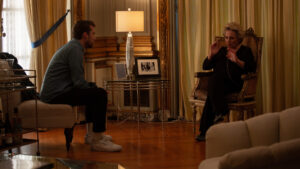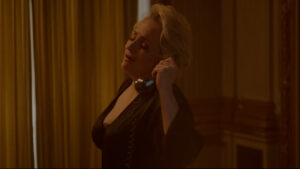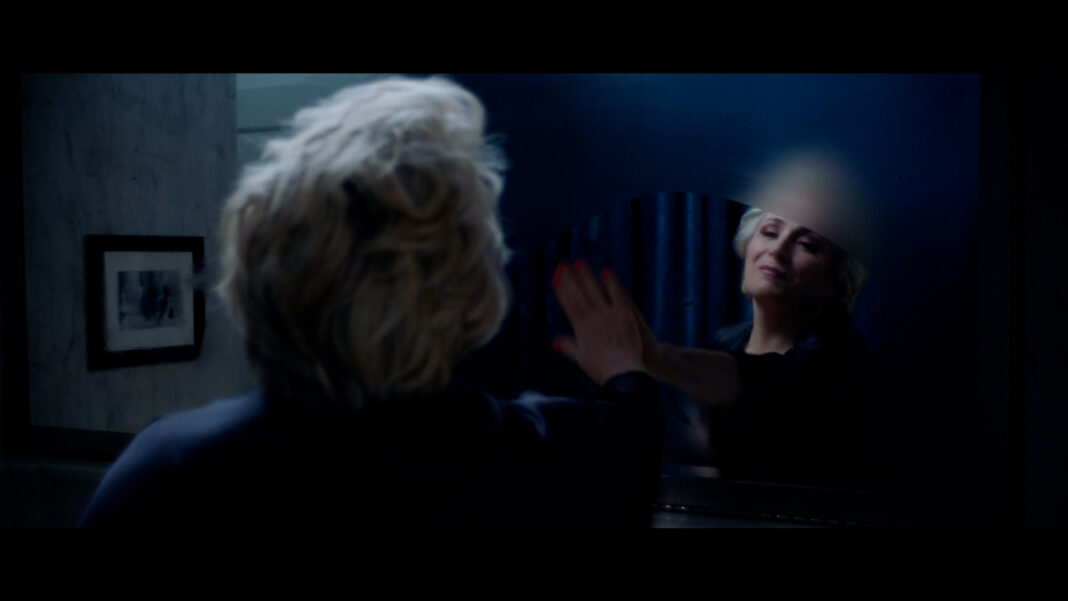
“You get to enjoy that really amazing experience of the audience responding to to what you’ve offered. But you cannot bite it. You have to you have to keep a distance from it and and be privileged to be in the same vicinity of that kind of experience.” Lyric soprano Patricia Racette has spent much of her career in such a vicinity.
Since bursting on the scene in 1992, Racette has had a robust career in opera and has appeared on stages around the world including La Scala, Los Angeles Opera, the Metropolitan Opera, San Francisco Opera, and Santa Fe Opera.
Recently Opera Philadelphia released a film of Francis Poulenc’s La voix humaine which finds Racette as a woman in the midst of a very personal phone call. We only hear her side of the call, but as written by Poulenc and librettist Jean Cocteau, it is a powerful depiction of a woman in crisis. James Darrah directed the film which is available for streaming now.
Recently I spoke via Zoom with Racette who was in her home near Santa Fe, New Mexico. We talked about the role, her upcoming plans to sing the role of Desirée in the Stephen Sondheim and Hugh Wheeler musical A Little Night Music and about the picture she paints of her career today. What follows are excerpts from our conversation that have been edited for length and clarity.
When you performed the role of Elle in La voix humaine five years ago in Chicago you said this was a part you’d always wanted to do. What was most appealing about this part for you?
The piece is endlessly rich dramatically. Vocally it is endlessly rich. The only thing you guys hear is my half of the conversation so I can change up what that conversation on the phone is and react accordingly; the context or the experience or the mode I’m in at that time can actually affect what that that experience is. It’s just phenomenal. I would never tire of doing the piece and never tire of exploring and finding new and different ways to articulate it all while keeping it respectfully with the composer’s wishes.
How has your relationship to the material and your performance of it evolved since you first performed La voix humaine?
My first exploration of it, I, in very fine writing, wrote down in my score what I imagined he was saying. Every time I’ve revisited it it’s something else, it’s something different. It’s like any role. I’ve had the great the blessing of being able to do a lot of iconic repertoire, which means I’ve sung roles for 100 times, 200 times. And the way you see that morph and change as you as a human being and consequently an artist morph and change, it’s sort of the same thing, except it’s even richer. It’s even more detailed because there’s not a concretized exposition of what he is saying. It gets to be how I hear it, what I’m hearing, and that’s just, theatrically speaking, so rich.
You’ve also sung roles in Poulenc’s Dialogues of the Carmélites. What is is about Poulenc’s music that you respond to?
Those who know the music of Poulenc, and even if they don’t, all they have to do is listen to a couple selections from a variety of his body of his work. You can have a sense of his very specific flavor and not following stylistic conventions of that time period and music, but really being unique in his own. And so his musical language, I think, and his marriage to the natural prosody of the French language is just is is so powerful and so immediate in its effect – at least that’s how it feels as a performer.
The film utilizes the arrangement for piano and voice, not the full orchestral arrangement of the opera. What made that the right choice for you and for the film?
It really lent itself well. The undeniable appeal of Poulenc’s orchestration is certainly duly noted and I love that. But in some ways it’s more cumbersome for such an intimate piece, for such a lonely experience that this character journeys through. The orchestration is actually quite thick in places where it, I think, can threaten the intimacy on an aural level.
I love doing it with piano because of that intimacy, because of that immediacy. It has to be said Chris Allen is a genius. He’s a wonderful conductor and his virtuosic skills of the keyboard are amazing. We did it with piano and live performance. We couldn’t see one another. We had to feel it. There are some very tricky moments and they just came off without a hitch. We had a very intimate musical relationship.

Director James Darrah, as I’m sure you know, is a big advocate of technology and new media as a way of increasing the audience for classical music and the performing arts. What do you what role do you think projects like this one will play moving forward, not just for you, but for the art form?
I think it’s an important expansion of the art form in the way we visually articulate it. This is a film. Sometimes I’m singing and I’m not moving my mouth. It’s really a proper film. And I think that has a lot of value because it gives the the director and the art form a chance to to be really authentic in its visual expression.
Sometimes we can look funny when we’re singing and sometimes it can be distracting for the moment. I don’t know how many bad jokes I’ve heard after years when I was singing Mimi [in La bohème]. Oh, yeah. You just keep singing even though you die. This gives us an opportunity to be more realistic about what those life situations are like.
Next year you’ll be singing the role of Desirée Armfeldt in Arizona Opera‘s production of A Little Night Music. What does Sondheim’s material offer you that’s unique to his writing?
I don’t know if you know this about me, but opera has been the interloper in my life. I came into this musical world wanting to be a torch singer, cabaret, jazz, things like that. I did a lot of that. I went to school hoping to pursue that and I fell into opera. Suffice to say, no regrets, of course. I reintroduced it into my musical life in 2004 and have been doing it regularly.
For me it’s like coming home. My recitals are my cabaret show. That’s where I have the chance to have that sort of intimate interchange, musically speaking, with the audience. I can’t wait to do this. It’s worth noting that my my wife, Beth [Clayton], who’s kind of a retired mezzo, is coming out of retirement to sing Charlotte.
I do think that one of the toughest songs in the world to get right is Send in the Clowns.
I think the context in which it happens in the show is so devastating. I’m just just now diving into it. Obviously I know the song, but I’m just now diving into the character. It has to be something that isn’t too intentionally presentational. It has to invite you, the audience, into that moment of loneliness and pain in a way that that’s quite precious and painful. The pain in that song is almost unbearable. I haven’t gotten through it yet without tearing up.

Poulenc said “My music is my portrait.” What is your portrait?
I’ve been always very adamant that in order to be an effective artist, you have to have – and I’ll speak for myself – a well-balanced life. My marriage to Beth, which was 24 years this year, is of the utmost importance in my life. And we are one another’s eyes and ears in terms of this art form. So we meld on so many levels.
I’m at a loss for words that truly connect to the profound experience that this art form can house. When I’ve had the feelings at my very best performances, I feel like a vessel. I feel like the artistic energy is occupying me. It’s coming and it’s very much personal. It’s very much mine. But it’s just coming out of me and it’s almost like you’re aware of it, but you just don’t get in its way.
I pride myself on always fleshing out a character and making it as authentic as possible. I’m hoping that has mattered. It’s not about the the most beautiful voice, the best singer, the best technique that matters; not to me at all. It matters to me that it’s truly invested and unique. I consider that the most humbling part of this art form.
All photos from La voix humaine by Michael Elias Thomas/Courtesy Opera Philadelphia













